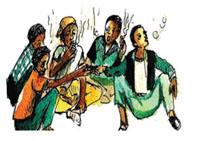Tobacco and Cigarettes

Tobacco is a plant originally grown in the Americas. The leaves are chewed or smoked in cigarettes or a pipe. Tobacco contains a psychoactive substance called nicotine which produces a feeling of happiness but can become addictive. Smoking tobacco also produces many other harmful substances such as tar, toxic chemicals similar to those found in hair dye and rat poison, and carbon monoxide. It is these substances that damage the smoker's health. Some immediate effects of smoking include shortness of breath, coughing blood, lungs burnt by the chemicals in cigarettes. Smoking causes yellow teeth and nails, dull hair, and wrinkled skin.
Cigarette smoking harms nearly every organ of the body, causing many diseases and affecting the health of smokers in general. Cigarette smoking increases the risk for many types of cancer, including cancers of the lip, oral cavity, pharynx, esophagus, stomach, pancreas, larynx (voice box), lung, uterine cervix, urinary bladder, liver and kidney. But smokers are particularly at risk of dying from lung cancer.
Cigarette smoking causes reduced circulation by narrowing the blood vessels (arteries). This can lead to high blood pressure and heart diseases. Circulatory problems can also make it difficult for a man to obtain and maintain a penile erection. If he does get an erection he may reach orgasm too quickly or be unable to have an orgasm. High blood pressure seems to also affect male hormones, such as testosterone and low levels of testosterone affect his semen; he makes few sperm and those he does produce are of poor quality. His sperm have low motility and many are malformed.
Smoking also makes women less fertile and reduces their chance of conceiving. Smoking causes damage to the baby, they are underweight at birth and tend to have blood pressure problems later in life.
Passive smokers (non smokers who are exposed to the cigarette smoke from smokers), are also adversely affected and could develop the same health problems that smokers have. Passive smokers inhale and are affected by the same smoke containing cancer causing and poisonous chemicals. One in five young people in Ethiopia are exposed to passive smoking at home.
The vast majority of tobacco users and smokers are hooked when they are young. Once hooked, the majority of tobacco users become hopelessly addicted. Young people are easily influenced by peer pressure and advertising on cigarettes.
The great thing about quitting smoking is that the negative effects on sexual and reproductive health are rapidly reversed – including the effects on the unborn baby. The risk of developing the adverse effects (cancers, heart disease, chronic respiratory tract diseases) of cigarette smoking also reduces when smokers quit smoking. You should counsel and encourage young smokers to quit smoking. However you also need to acknowledge that it may be difficult for them to do this immediately. Many people who aim to quit are not successful the first time they try but will be successful later.
Nicotine is a psychoactive substance that can become addictive. An addict experiences withdrawal symptoms. When smokers quit smoking, they often experience one or more of the following withdrawal symptoms:
- A strong urge to smoke
- Feeling angry
- Feeling anxious
- Feeling depressed
- Finding it hard to concentrate
- Feeling headachy, restless or tired
- Feeling dizzy
- Chest pains, cough or nasal drip
- Being hungry or gaining weight
- Having trouble sleeping.
These symptoms are temporary, and they vary from person to person. During the first week, these symptoms may be strong and the chance of relapse is great. The following could help smokers after they quit smoking:
- Drinking a lot of water and fruit juice and avoiding drinks that contain caffeine or alcohol.
- Trying sugar-free gum or hard candies, or carrots.
- Staying busy: engaging in activities that are hard to combine with smoking
- Avoiding situations and places which the smoker strongly associates with the pleasure of smoking.